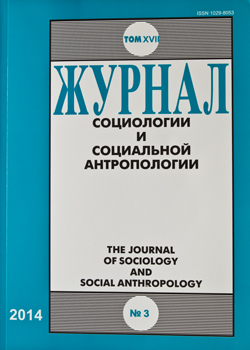Migration Theories: from Assimilation to Transnationalism
Keywords:
migration theory, assimilation theory, theory of segmented assimilation, multiculturalism, transnationalism
Abstract
This paper explores the history of migration studies in the USA and in Europe, starting from Chicago school (1910-1920s) and coming to current trends in this field. I cover historical development of assimilation theory, the framework of the “Melting Pot”, then get to 1960s and the rise of its criticism due to ethnocentric approach. I also trace later developments of this concept into revised assimilation theory (Verba, Nee, Moravska), and into segmented assimilation concept (Portes, Rumbaut, Zhou, Waters). I see multiculturalism as a global trend that changed the way of thinking about ethnicity on both continents and brought to life new theories, like transnationalism in European sociology (Glick Schiller, Foner, Vertovec). I also point at some contradictions of European and American approaches in migration theory in certain aspects, such as the effect of religiosity on integration success (Foner, Alba, Van Tubergen). Russian studies in this field that became numerous in the recent years are disregarded intentionally as they get covered in many other works, while the most recent trends of the international migration theory are not profoundly utilized in Russian sociology yet. Another reason is that they still lack broader theoretical perspective and stay more empirical.
Published
2014-02-20
How to Cite
Kostenko, V. (2014). Migration Theories: from Assimilation to Transnationalism . ZHURNAL SOTSIOLOGII I SOTSIALNOY ANTROPOLOGII (The Journal of Sociology and Social Anthropology), 17(3), 62–76. Retrieved from http://jourssa.ru/jourssa/article/view/658
Section
Sociology of Migration

